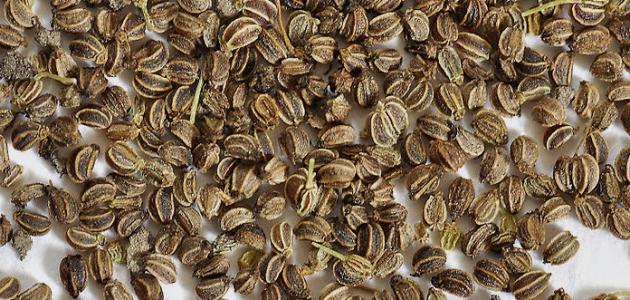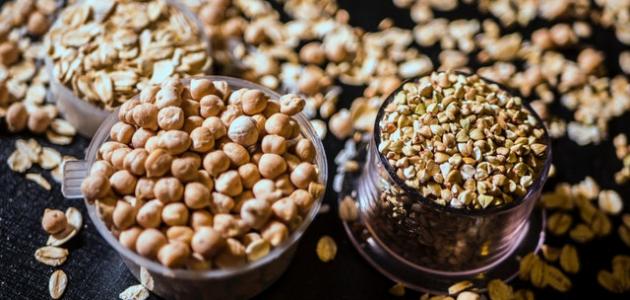Moringa
Moringa, or banyan (in English: Moringa), belongs to the Albanian family (in English: Moringaceae) and is also known as the oleifera, the shua, or the banyan branch, and its scientific name is Moringa oleifera. It is an evergreen plant that grows to a height of approximately 8 to 9 metres. It is grown all over the world, and its leaves and seed pods are used in food. The leaves can be eaten fresh, cooked, or ground, and they can be stored in powder form for several months without losing their nutritional value. This powder can be used as a type of... Spices, its leaves can be added to fruit juice, or used instead of spinach in many recipes. It is worth noting that dried moringa leaves are available in the form of nutritional supplements.
Benefits of moringa for weight loss
Using moringa can enhance weight loss, as a laboratory study published in the journal Frontiers in Pharmacology in 2018 showed that moringa leaf extract inhibits the accumulation of fats, by inhibiting the process of their formation and promoting their decomposition.[XNUMX] It is worth noting that studies have not indicated the effect of moringa in reducing weight in humans, but some studies have been conducted on the effect of nutritional supplements containing moringa and a number of other ingredients in reducing weight, as another study was conducted and published in the journal Diabetes, Obesity and Metabolism. In 2018, 140 overweight people were given approximately 900 milligrams of nutritional supplements containing moringa, divided into two doses per day, in addition to following a calorie-control diet and walking for 16 weeks. The results showed a significant decrease in weight and body mass index, in addition to a decrease in waist and hip circumference. A decrease in the levels of harmful cholesterol in the blood and an increase in the level of beneficial cholesterol were also observed, but it is worth noting that it is not clear whether these results are related to moringa alone. , or with a mixture of herbs, so there is a need to conduct more studies on this effect.
Read also:The best diet for the abdomenEvidence has shown that moringa extract can affect weight loss and control of weight gain in mice, as it contains vitamin B, which helps improve the digestive process and convert food into energy, without storing it in the form of fat, but caution must be taken when consuming any type of supplement. Food, as it is not supervised by the United States Food and Drug Administration, and it is necessary to confirm the extent of its safe use and its possible side effects.
Nutritional value of moringa
The following table shows the value of the nutrients contained in 100 grams of moringa plant:
| Nutrient | Nutritional value |
|---|---|
| Calories | 64 calories |
| Protein | 9.4 grams |
| Fats | 1.4 grams |
| Carbohydrates | 8.28 grams |
| Dietary fiber | 2 grams |
| Calcium | 185 milligrams |
| Iron | 4 milligrams |
| magnesium | 42 milligrams |
| phosphorous | 112 milligrams |
| potassium | 337 milligrams |
| Sodium | 9 milligrams |
| zinc | 0.6 milligrams |
| Copper | 0.105 milligrams |
| manganese | 1.063 milligrams |
| selenium | 0.9 mcg |
| Vitamin B6 | 1.2 milligrams |
| Vitamin C | 51.7 milligrams |
| Vitamin A | 7564 international units |
Other herbs for weight loss
It can be said that there is no specific type of food or herb that can help reduce weight, but some herbs can be added to a healthy diet for weight loss, in addition to exercising to enhance the results. Below are some herbs that can reduce appetite: It increases fat burning:
Read also:Best diet ever- Ginger: Ginger contains compounds known as Gingerols and Shogaols, which stimulate a number of vital processes in the body. Although eating ginger does not directly cause weight loss, it may help reduce the risk of cardiovascular disease and other side effects. Associated with weight gain, it is also believed that ginger can help reduce weight, as a comprehensive analysis of 14 studies, published in the journal Critical Reviews in Food Science and Nutrition in 2019, indicated that consuming ginger reduces weight, waist-to-hip ratio, and blood sugar. Fasting blood, in addition to increasing the level of good cholesterol, but without affecting the body mass index, insulin, and lipid level. Researchers also point out that obesity may cause oxidative stress, resulting from damage caused by free radicals, so Ginger's antioxidant content helps control free radicals.
- Another systematic study published in the journal Phytotherapy Research in 2017 showed that ginger can reduce obesity, by increasing thermogenesis, increasing lipolysis, reducing fat formation, and reducing intestinal absorption of fat. In addition to controlling appetite.
- the ring: Fenugreek seed extract can reduce fat consumption, as a study published in the European Journal of Clinical Pharmacology in 2009 indicated that taking fenugreek seed extract for 6 weeks reduced the amount of fat consumed in people who are overweight, but it did not affect It reduces appetite, weight, or feelings of fullness. Adding 4 or 8 grams of fenugreek fiber to breakfast can increase feelings of fullness and reduce feelings of hunger, but its effect in reducing weight has not yet been proven.
- Turmeric: There is not sufficient evidence to prove the effect of turmeric in helping to reduce weight, but adding it to food can reduce the need to add salt, fat, and sugar, and it also enhances the flavor. A study published in the European Review for Medical and Pharmacological Sciences in 2015 showed that it Consuming curcumin, which is present in turmeric, for 30 days increases weight loss by 4.91%, reduces waist circumference by 4.14%, and reduces body fat by 8.43%, in addition to reducing the body mass index. body, hip circumference,[XNUMX] In addition, another laboratory study was conducted and published in The Journal of Nutrition in 2009, the results of which showed that consuming turmeric supplements in mice while subjecting them to a high-fat diet did not affect the amount of food eaten, but it reduced weight gain and reduced body fat.
- Cinnamon: Cinnamon is one of the aromatic spices used in cooking food, and it is one of the foods rich in antioxidants, which provides the body with a number of health benefits. It is believed that cinnamon can promote weight loss, as it controls blood sugar levels, which may help reduce appetite and reduce Feeling hungry, as it contains a certain compound that performs a function similar to insulin, which helps transport sugar through the bloodstream, to transport it to the cells, and use it as an energy source. In addition, it is possible for cinnamon to reduce some of the digestive enzymes, to reduce the breakdown of carbohydrates, but There is a need for more studies to confirm the role of cinnamon in reducing appetite and reducing weight.
- Ginseng: Many studies have suggested that ginseng can contribute to weight loss, including a preliminary study published in the Journal of ginseng research in 2014, which showed that taking ginseng extract for 8 weeks by women suffering from obesity affects the components of the intestinal bacterial flora (in English: Gut microbiota), which is a group of microbes found in the intestine, which helps digestion and has an effect in reducing weight. Another study was conducted on mice and published in the journal Cytotechnology in 2010, the results of which showed that ginseng extract can have an anti-obesity effect. It may reduce the formation of fats and delay their absorption in the intestine.
- Oregano: Or what is known as common marjoram, or Irrican marjoram, which is a perennial plant that belongs to the same family as mint, sage, thyme, rosemary, and basil. Oregano contains an active substance known as carvacrol, which may help enhance Weight loss: A laboratory study was published in The Journal of Nutritional Biochemistry in 2012, the results of which showed that taking carvacrol nutritional supplements in mice, along with a high-fat diet, reduced weight gain, reduced the weight of visceral fat, and reduced the level of fat in their blood. But more studies on this effect in humans are still needed.
- latency: Cumin can contribute to weight loss, as a study published in the journal Complementary Therapies in Clinical Practice in 2014 was conducted on a group of women who suffer from overweight or obesity, and the results showed that their consumption of dried cumin powder, added to milk, twice daily for a period of time. For three months, it reduced the levels of good cholesterol and harmful cholesterol. It also reduced weight, body mass index, waist circumference, and fat mass, and increased the level of good cholesterol in the blood. Another systematic study that included 6 studies published in the journal Phytotherapy Research in 2018 showed, Cumin reduces the concentration of total and harmful cholesterol, and increases the levels of beneficial cholesterol.
General benefits of moringa
Moringa is an herb rich in many nutrients beneficial to health, such as antioxidants, and many vitamins and minerals, such as vitamin C and vitamin A, in addition to calcium, potassium, and magnesium.
Read also:Harmful effects of harsh dieting
Moringa side effects
Moringa safety level
Moringa leaves, fruits, and seeds are consumed in moderate amounts in food often safe, as potentially safe Consuming its leaves and seeds in medicinal doses for a short period, however Likely unsafe Consuming its roots, because they contain toxic substances known as Spirochin.
Warnings of using moringa
Caution should be exercised when using the moringa plant in several cases, including the following:
- pregnant woman: that Likely unsafe Pregnant women consume moringa bark, roots, and flowers, as the chemicals contained in them may lead to contraction of the uterine muscle, so they should be avoided during pregnancy.
- Breastfeeding: Moringa is sometimes used to increase milk production, and it can be said that it is considered safe if consumed for several days, but there is not enough information about its safety for infants, so it is best to avoid consuming it during breastfeeding.
- children: Moringa leaves are recommended for children to eat Potentially safeWhen consumed for up to two months.
- People with diabetes: Moringa may reduce blood sugar levels in people with diabetes, so sugar levels and signs of hypoglycemia should be monitored when consuming moringa.
- Those suffering from hypothyroidism: (in English: Hypothyroidism); Moringa consumption can exacerbate hypothyroidism.









